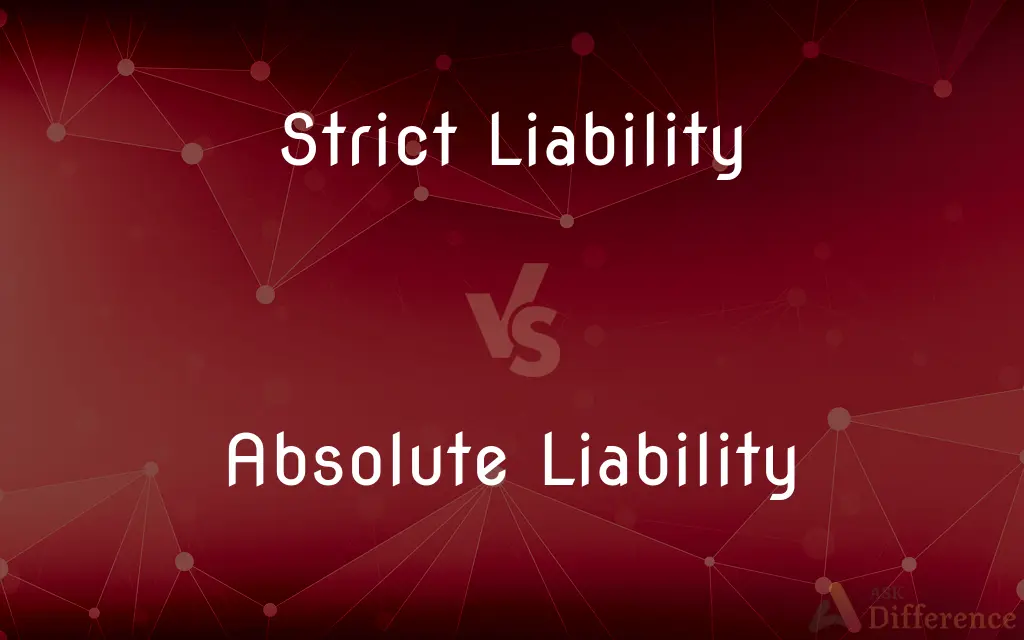Strict Liability vs. Absolute Liability — What's the Difference?
Edited by Tayyaba Rehman — By Fiza Rafique — Published on December 26, 2023
Strict Liability holds a party liable for damages without proving negligence, but exceptions apply; Absolute Liability implies full responsibility regardless of fault or exceptions.

Difference Between Strict Liability and Absolute Liability
Table of Contents
ADVERTISEMENT
Key Differences
Strict Liability and Absolute Liability are both legal principles that hold individuals or entities accountable for damages or harm caused. However, the nature and extent of this accountability differ between the two. Strict Liability holds a party accountable for damages without the need to prove negligence or fault. Still, it often comes with recognized exceptions where the defendant may escape liability if certain conditions are met.
On the other hand, Absolute Liability implies a level of responsibility that is unyielding in its application. In cases of Absolute Liability, a defendant is held entirely accountable irrespective of any precautions taken or the absence of negligence. In essence, once harm or damage has occurred, and it's traced to the defendant's actions or products, they are held liable without any defenses.
The rationale behind Strict Liability is to ensure that certain activities, often seen as hazardous, are conducted with utmost care, considering the potential harm they can cause. Even if the person undertaking these activities has taken all possible precautions, they can be held liable under the doctrine of Strict Liability, albeit with certain exceptions. Conversely, Absolute Liability is adopted in scenarios where the potential harm is so great that society believes there should be no exceptions or defenses, ensuring maximum caution and responsibility.
In the context of legal jurisprudence, Strict Liability tends to be more lenient compared to Absolute Liability. The latter's uncompromising nature ensures that industries or individuals dealing in potentially highly hazardous activities or products are always on their toes, bearing the onus of any harm resulting from their actions or products. Both concepts, while varying in their severity and application, aim to ensure that potential victims are compensated, and parties are held accountable for their actions.
Comparison Chart
Definition
Liability without proving negligence but with exceptions.
Liability without any exceptions or defenses.
ADVERTISEMENT
Exceptions
Recognized exceptions may apply.
No exceptions or defenses allowed.
Rationale
Ensures hazardous activities are conducted with care.
Ensures utmost caution in extremely hazardous situations.
Degree of Leniency
Relatively lenient, with defenses.
Uncompromising and stringent.
Legal Application
Used in cases with potential harm but allows for defenses.
Adopted in scenarios with immense potential harm and no defenses.
Compare with Definitions
Strict Liability
Strict Liability applies even without proving fault.
The company faced Strict Liability charges due to the harm their product caused.
Absolute Liability
Absolute Liability is uncompromising in holding entities accountable.
Under Absolute Liability, the company had to compensate victims, despite having followed all safety protocols.
Strict Liability
Strict Liability holds entities accountable for certain hazardous activities.
Despite precautions, the firm was charged under Strict Liability for the oil spill.
Absolute Liability
Absolute Liability ensures maximum caution and responsibility.
Due to Absolute Liability, the pesticide producer was held accountable for the water contamination.
Strict Liability
Strict Liability ensures compensation to victims without proving fault.
Because of Strict Liability, the victims received compensation even without proving the factory's negligence.
Absolute Liability
Absolute Liability ensures victims are compensated without exceptions.
Absolute Liability meant that the gas leak victims were compensated, regardless of the company's defenses.
Strict Liability
Strict Liability emphasizes responsibility without establishing negligence.
The chemical plant was under Strict Liability due to potential risks, even though they were not negligent.
Absolute Liability
Absolute Liability offers no defenses or exceptions.
The nuclear plant bore Absolute Liability for the radiation leak, regardless of precautions taken.
Strict Liability
Strict Liability has recognized legal exceptions.
Under Strict Liability, the builder was initially charged, but the natural disaster exception applied.
Absolute Liability
Absolute Liability applies in extremely hazardous situations.
The dynamite manufacturer was charged with Absolute Liability after the explosion.
Common Curiosities
Why is Strict Liability implemented?
Strict Liability ensures certain potentially hazardous activities are undertaken with care, providing compensation to victims without proving negligence.
What is Strict Liability?
Strict Liability holds entities liable for damages without proving negligence, but certain exceptions might apply.
How does Absolute Liability differ from Strict Liability?
Absolute Liability holds parties fully responsible regardless of fault, precautions, or exceptions.
Can a defendant use defenses under Absolute Liability?
No, Absolute Liability does not allow any defenses or exceptions once harm is proven.
Does Strict Liability always result in penalties for the defendant?
Not always; if the recognized exceptions apply, the defendant may not be held liable under Strict Liability.
Why is Absolute Liability considered strict?
Absolute Liability is strict because it offers no defenses or exceptions, holding entities completely responsible.
Is Strict Liability more lenient than Absolute Liability?
Yes, Strict Liability is relatively more lenient as it allows for certain defenses and exceptions.
Is Absolute Liability common in legal systems?
It's less common and usually reserved for extremely hazardous activities where the potential harm is immense.
Are there exceptions in cases of Strict Liability?
Yes, Strict Liability often comes with recognized legal exceptions based on the situation.
When is Absolute Liability typically applied?
Absolute Liability is applied in extremely hazardous situations where the potential harm is so great that no exceptions or defenses should be allowed.
Are both Strict Liability and Absolute Liability concerned with victim compensation?
Yes, both aim to ensure victims receive compensation, but their application and exceptions differ.
Between Strict Liability and Absolute Liability, which one offers no defenses?
Absolute Liability offers no defenses or exceptions, making it more stringent than Strict Liability.
Can a company avoid penalties under Absolute Liability by proving they took precautions?
No, under Absolute Liability, even if all precautions were taken, the entity is still held accountable.
Which liability ensures maximum caution in industries?
Absolute Liability, due to its uncompromising nature, ensures maximum caution.
Can victims always get compensation under Strict Liability?
While Strict Liability aims to compensate victims, recognized exceptions might prevent compensation in some cases.
Share Your Discovery

Previous Comparison
Queen Crab vs. Snow Crab
Next Comparison
Simple Epithelium vs. Stratified EpitheliumAuthor Spotlight
Written by
Fiza RafiqueFiza Rafique is a skilled content writer at AskDifference.com, where she meticulously refines and enhances written pieces. Drawing from her vast editorial expertise, Fiza ensures clarity, accuracy, and precision in every article. Passionate about language, she continually seeks to elevate the quality of content for readers worldwide.
Edited by
Tayyaba RehmanTayyaba Rehman is a distinguished writer, currently serving as a primary contributor to askdifference.com. As a researcher in semantics and etymology, Tayyaba's passion for the complexity of languages and their distinctions has found a perfect home on the platform. Tayyaba delves into the intricacies of language, distinguishing between commonly confused words and phrases, thereby providing clarity for readers worldwide.












































